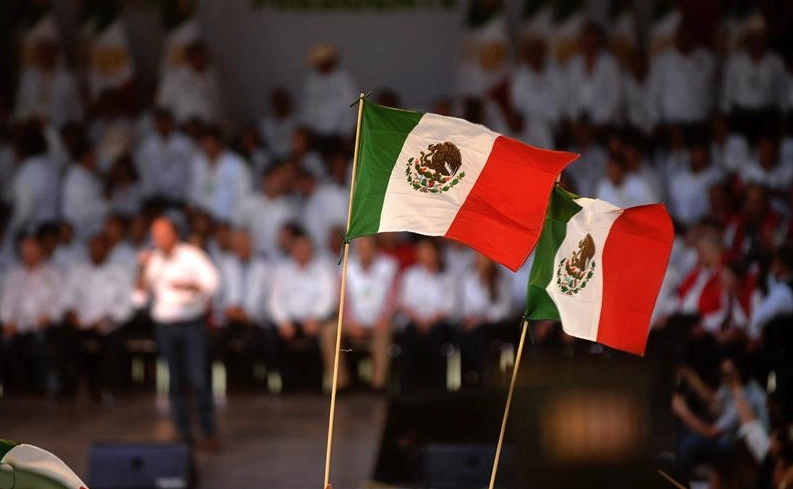The level of political debate in Mexico is at rock bottom. It does not help to have a president who has emptied the political language of content, and whose words are like the noise in the street: it is heard, but it is not listened to. In this context, the campaigns that are starting toward next year’s presidential elections do not aim to be a battle of ideas. But that does not mean that the Mexico 2024 elections will be inconsequential. Quite the contrary. Nothing more or less than the survival of the country as we know it is at stake. To be clear, in these elections, there are two obvious options.
On the one hand, the traditional parties (PAN, PRI, PRD), which defend the constitutional order of 1917 and the legacy of the democratic transition (1977-1996). On the other, the ruling Morena Party and its allies (MC, PT, PVEM), which propose a new political regime still without precise outlines but with AMLO and his entourage at the center. So, from a certain perspective, and given what is at stake, the candidates themselves are not so relevant. But let’s turn our gaze to them.
Claudia Sheinbaum: AMLO’s dauphin
Claudia Sheinbaum is the ruling party’s candidate. She is a gray civil servant whose political career has always run under the shadow and direction of AMLO, from whom she has not strayed a millimeter. But if they think they are political soul mates (ironic laughing), they have already made a mistake. AMLO and Sheinbaum could not be more different in origin and history. AMLO is a social leader from the very heart of the Mexican tropics, who came to power by shaking up the street. Sheinbaum belongs to an enlightened middle class in the capital, and her rise to power has followed meritocratic paths, to the extent that she has been able to show AMLO what he most appreciates in a subordinate: absolute submission. This is to the point that recently we have seen what I would call the tropicalization of Claudia Sheinbaum. Indeed, if during her entire political career she showed herself as a cold and academic figure, giving herself intellectual airs, in the past three years she has mimicked her boss. It is impressive to watch. She has adopted the same tone of voice and the same crutches as his boss. It is embarrassing.
Xóchitl Gálvez: she can, but does she want it?
On the side of the opposition alliance, we have Senator Xóchitl Gálvez, who burst in with force this year to become the opposition candidate. Ironically, it was AMLO himself who promoted her. In a fit of arrogance, he did not want to receive her on his morning show and rectify his unfounded criticism of the senator. Xóchitl awakened great enthusiasm among the population, who initially perceived her as someone who could stand up to AMLO. Among other issues, this happened because she upset the pro-poor and indigenist, clientelist discourse of this government. Xóchitl is an Otomí indigenous woman who, due to her merits, climbed the economic ladder. That initial enthusiasm, however, has been diluting. The senator, far from going for AMLO and Sheinbaum’s jugular, has preferred to run a campaign of witticisms and pleasantries, which has had little resonance among society. Her ship is now in the water and many wonder if she wants to win. Her party, the PAN, was a party that did not want to win for many years but was satisfied with being the opposition and acting as a moral compass. It seems that Xóchitl is going in that direction.
Samuel García: 15 minutes of infamy
At the time of writing, it is not clear whether Samuel García will be a candidate. Nor is it known if he is still governor of the State of Nuevo León (bordering Texas). In the last few days, he has been making a fuss about whether to continue as governor or to run for the presidency of Mexico. While the matter is being clarified, what is important to know about him is that his candidacy was promoted by AMLO to divide the opposition vote. The second thing to know is that his main political cards are his supposed youth (35 years old) and a pretended plainness in his projected ranch-style speech. But where some see freshness, others see vulgarity; a matter of approach and personal taste. Oh, and one more thing: García’s main political capital is his wife, the influencer Mariana Rodríguez Cantú, who lends him her spotlight and followers on social networks. This is another case of what in the U.S. is called a power couple.
Verástegui: the lone plainsman
There is another candidate: Eduardo Verástegui, a soap opera actor whom you may remember in Una luz en el camino (1998), Soñadoras (1998-1999) and Alma rebelde (1999). Verástegui has reinvented himself as a Mexican libertarian and boasts his closeness to Javier Milei, and the leader of Vox in Spain, Santiago Abascal. The truth is that he has it very difficult. But in politics, there are no impossibilities. For example: among my acquaintances who support AMLO, Verástegui’s candidacy is seen with good eyes. How to explain that an AMLO voter would consider voting for a candidate in the antipodes? Answer: because they may not be in the antipodes. Bukele, AMLO, Trump, Sanders, Milei, and Verástegui: all of them present themselves as outsiders, anti-establishment, and declared enemies of imagined “castes”, “power mafias”, “old ideas”, “old politics”. “The Swamp”, “Washington”, “politicking”. It does not matter what they call it. The goal is to connect with the immense and justified frustration and anger that exists against governments. Even if it costs us democracy.
*Translated by Janaína Ruviaro da Silva from the original in Spanish













